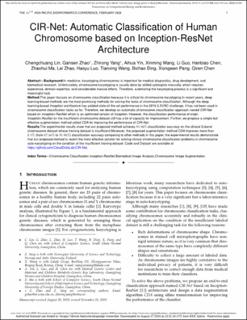| dc.contributor.author | Lin, Chenguang | |
| dc.contributor.author | Zhao, Gansen | |
| dc.contributor.author | Yang, Zhirong | |
| dc.contributor.author | Yin, Aihua | |
| dc.contributor.author | Wang, Xinming | |
| dc.contributor.author | Guo, Li | |
| dc.contributor.author | Chen, Hanbiao | |
| dc.contributor.author | Ma, Zhaohui | |
| dc.contributor.author | Zhao, Lei | |
| dc.contributor.author | Luo, Haoyu | |
| dc.contributor.author | Wang, Tianxing | |
| dc.contributor.author | Ding, Bichao | |
| dc.contributor.author | Pang, Xiongwen | |
| dc.contributor.author | Chen, Qiren | |
| dc.date.accessioned | 2020-09-03T11:48:50Z | |
| dc.date.available | 2020-09-03T11:48:50Z | |
| dc.date.created | 2020-08-27T15:26:57Z | |
| dc.date.issued | 2020 | |
| dc.identifier.issn | 1545-5963 | |
| dc.identifier.uri | https://hdl.handle.net/11250/2676232 | |
| dc.description.abstract | Method: This paper focuses on chromosome classification because it is critical for chromosome karyotyping. In recent years, deep learning-based methods are the most promising methods for solving the tasks of chromosome classification. Although the deep learning-based Inception architecture has yielded state-of-the-art performance in the 2015 ILSVRC challenge, it has not been used in chromosome classification tasks so far. Therefore, we develop an automatic chromosome classification approach named CIR-Net based on Inception-ResNet which is an optimized version of Inception. However, the classification performance of origin Inception-ResNet on the insufficient chromosome dataset still has a lot of capacity for improvement. Further, we propose a simple but effective augmentation method called CDA for improving the performance of CIR-Net. Results: The experimental results show that our proposed method achieves 95.98% classification accuracy on the clinical G-band chromosome dataset whose training dataset is insufficient. Moreover, the proposed augmentation method CDA improves more than 8.5% (from 87.46% to 95.9%) classification accuracy compared to other methods. In this paper, the experimental results demonstrate that our proposed method is recent the most effective solution for solving clinical chromosome classification problems in chromosome auto-karyotyping on the condition of the insufficient training dataset. Code and Dataset are available at https://github.com/CloudDataLab/CIR-Net. | en_US |
| dc.language.iso | eng | en_US |
| dc.publisher | Institute of Electrical and Electronics Engineers (IEEE) | en_US |
| dc.title | CIR-Net: Automatic Classification of Human Chromosome based on Inception-ResNet Architecture | en_US |
| dc.type | Peer reviewed | en_US |
| dc.type | Journal article | en_US |
| dc.description.version | acceptedVersion | en_US |
| dc.source.journal | IEEE/ACM Transactions on Computational Biology & Bioinformatics | en_US |
| dc.identifier.doi | 10.1109/TCBB.2020.3003445 | |
| dc.identifier.cristin | 1825603 | |
| dc.description.localcode | © 2020 IEEE. Personal use of this material is permitted. Permission from IEEE must be obtained for all other uses, in any current or future media, including reprinting/republishing this material for advertising or promotional purposes, creating new collective works, for resale or redistribution to servers or lists, or reuse of any copyrighted component of this work in other works. | en_US |
| cristin.ispublished | true | |
| cristin.fulltext | postprint | |
| cristin.qualitycode | 1 | |
